Fred Griffith
TV Pioneer Still Cooking
On the Air and OffThis is the story of a man we all know. We've seen him on our television for more than 50 years. We are going to take a look behind the screen at the real Fred Griffith. Fred was born on January 3, 1929 in Charleston, West Virginia. His family owned a restaurant strategically placed between the towns two newspapers, The Charleston Gazette and the Daily Mail. It was a 24 hour restaurant, so in addition to the workers from the papers, they also got a lot of business from truck drivers, police and fire workers and cab drivers. From the time Fred was twelve he worked at the restaurant; "It was a family obligation." WWII was going on at the time, so it wasn't easy to find young men to work. He was the oldest of six children (three boys and three girls) and his father put all of the boys to work in the family business. "In retrospect it was probably sexist that he never had my sisters work there." All but one of his siblings are still alive and doing well. His youngest brother died at the age of 62 from heart problems. 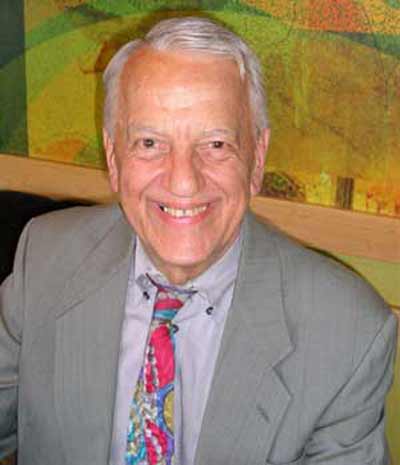
"I worked at the restaurant for years before I was allowed to mess with the food." He remembers that the word "chef" was not really used then; instead they were "cooks." Myrtle Long was in charge of the kitchen "what you would call the Executive Chef today. She never had any recipes but made all of the main meals of the day." In the off hours, when the main meals weren't being served the short order cooks took over and by the time he was in college Fred was a short order cook. He'd come home from college for the summer and often worked all night at the restaurant. College for Fred was West Virginia University about 200 miles "over bad road" from home. Even when he was at school he worked. "I always had a job. I was never idle." He cleaned kitchens and scrubbed pots and pans in exchange for food while he was in school. The school was a state supported land grant school with a tuition of $40.00 a semester plus books. He had been a good high school student and his father insisted that all of the boys go to college. His father had never gone past the 4th grade, but he was "quite an intellectual and widely read." He told Fred he didn't want to "commit him to a life like he had." In fact, he was even more specific. Fred's father wanted him to go to college, get a law degree and become the Governor of West Virginia. Fred actually majored in philosophy with an undeclared minor in Cultural Anthropology. "It was a quiet rebellion. I was under pressure to do pre-law and it really didn't interest me." His father had read all of the great philosophers and Fred started reading the contemporary philosophers and "fell into the sway of some of the professors on campus." Fred had learned early on that "there is no ultimate answer anyone can achieve" and found philosophy and cultural anthropology intriguing. It eventually became time for grad school, but instead he was commissioned in the Air Force. The Korean War was on at the time and although he was doing Reserve duty, not active duty, he knew his time was coming. 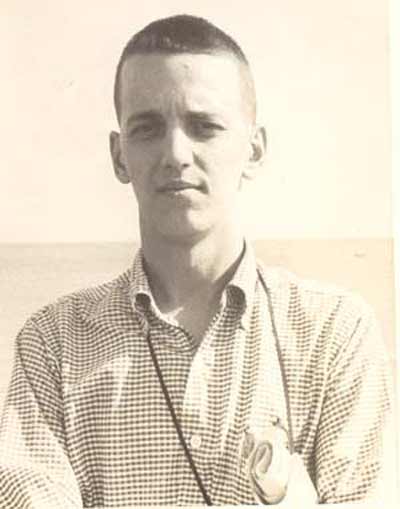
A young Fred Griffith in the military
Every job he applied for he was asked his military status and when he told them they all said he should look them up when he got back from military duty. He continued to do his Reserve Duty in Cape Cod while he looked for a job and waited to be called up. His Uncle Perry was the head news reporter at a radio station in Charleston. He told Fred about a job at a rival station as a news writer. Fred went to the interview and they neglected to ask him about his military commitment. He got the job and soon after was called into active duty. He applied for flight training, hoping to be a pilot, but his eyes kept him from passing the physical. Looking back now he's happy to have failed the physical when he realizes how many pilots did not come back. Instead he was sent to Alabama where he became an Administrative Officer at the Naval Air Force Base. He did his entire two years of active duty there. Because the paper in Charleston had hired him they were obligated to give him back his job when he returned from the service, so Fred had a job waiting when he got home. He continued to do more things - adding skills and titles to his resume. He was head of News, then News and Programming and then programming Director. This was near the end of 1958. He was married in 1951 and had his first child, Barbara, in 1952. His next daughter, Leslie was born in 1958. With a wife and two children he knew he had to move to a bigger market where there was the possibility of making more money. In the broadcasting business there are limits to how much money you can make in a given market. Charleston was a small market and therefore Fred had to choose between going into sales, (where there was more money), management (which he had done and didn't appeal to him much), or moving.
"The only big city I knew was Cleveland." Although he had been to New York and a few other places, he had no connections there. In Cleveland he had a good friend, Jerry Smith, from school. 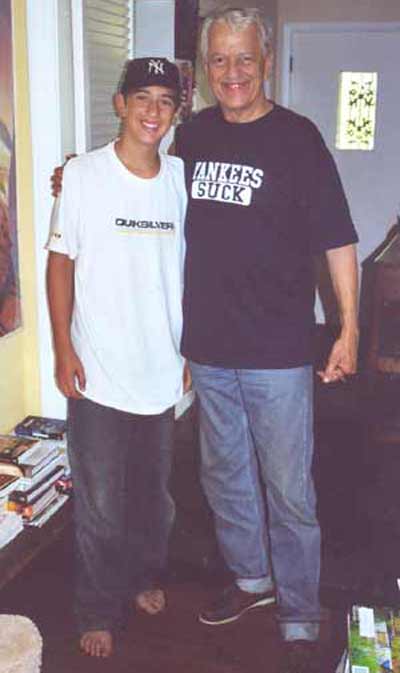
Fred's shirt tells his Yankee fan
grandson Forrest how he feels
He sent out resumes to every station that he thought he would fit in. Since he had done a Classical Musical Show in Charleston he was offered a job at WDOK and came to town in 1959. They lived in Lakewood where they stayed until 1972. In 1960 tragedy struck the Griffith household. While his wife was in the hospital having their third child, Gwen, their two year old baby died. It was an event so horrific that he speaks little of it, but acknowledges it as a defining moment in his life. Two years later they had their son, Wally. 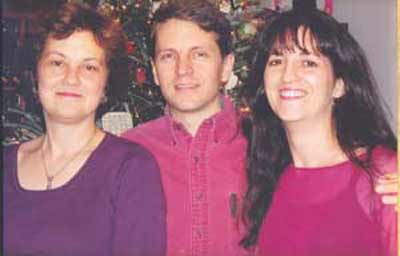
Barbara, Wally and Gwen
He worked with the likes of Howie Lund at WDOK in the public affairs and news department. Norman Wayne bought the station and it became "WIXY 1260" and the format changed drastically. "They really tried to just fit the news in and get it out of the way to fulfill any obligations they had with the FCC." Betty Cope from Channel 25 (WVIZ) called him and said she knew he couldn't be happy at WIXY and offered him the opportunity to come over to the station. Late in 1965 he went to WVIZ and started doing local issue and public affairs shows. "We were really ahead of our time. Sometimes we had a roundtable forum, but we always touched on issues that weren't really being talked about." For example, he remembers one particular show that received national attention in the Public Broadcasting world. It was titled "Marginal Merchants: The Negro in Business" and discussed why some businesses could not do as well as others. His next call came from Don Perris who invited him to write news for Tom Field who did a 15 minute newscast at 11:00. "Tom never wrote his own copy and he had to have a little kick or joke at then end of each broadcast." Fred took the job, but he never gave up his other jobs. Accordingly he would leave his house at 5:30 every morning to go downtown where he did a Business radio show for WERE, sponsored by Paine Weber. Then from 8:00 to 5:00 he worked at Channel 25. Then he went and wrote and produced the 11:00 news for Channel 5. Don Perris turned out to have the most impact on Fred's broadcast life. "There were no rules at the time. Don Perris, as much as anybody in the world, defined what television would and should be. He had the right balance of journalism and business. He is the one who taught us all to "Respect the intelligence of the Audience" and never talk down to or pander people watching." 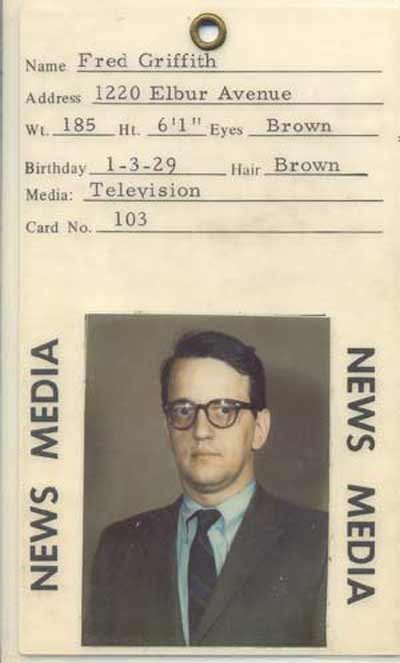
Fred Griffith press pass for WEWS
Eventually Channel 5 became full time and he left the other jobs. He moved to the "day side" of television running the operations. He was News Director for over two years, and then public affairs. He was doing interviews on air until 1972. It was in June, 1972 that Alan Douglas left the Morning Exchange. Fred was asked to fill in until they decided what to do with the spot. Joel Rose was doing commentary and Liz Richards was doing the weather. He invited them to start the show with him each day instead of the previous method of Douglas by himself. "I had worked with Joel since 1967. I wanted them to be part of the texture of the show." Thus, the morning team of hosts was created for the very first time. It is standard format for talk shows now, but it was a new concept in 1972. 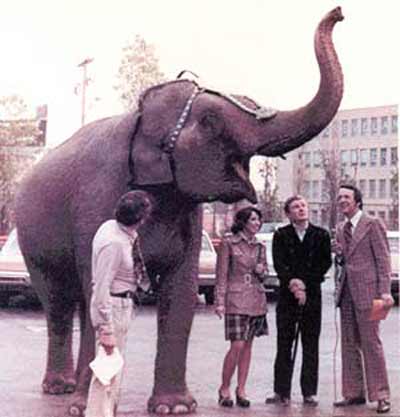
Morning Exchange's Fred Griffith, Joel Rose and Liz Richards with an elephant and trainer from the Ringling Brothers Barnum & Bailey circus in the early 1970's
What started out to be a fill in job continued until 1999 when Morning Exchange went off the air. In the spring of 1973 their ratings edged everyone out, including the Today Show. This "trend" continued for the next 18 years. Although must would agree Fred was the major reason for the success of the show, he credits the good people he worked with. "The producers always booked good shows and I worked with very intelligent, terrific people." Referring specifically to Liz Richards he says "She is so smart. There is a terrific intelligence in that woman." There would be a show meeting every day before the show and every day after the show there would be a critique. Every guest was rated. With a score of B or better the guest would be asked back. B- or less and they were not asked to return. As for Fred he says "I always try to think about other people, what is good for them. Maybe I should have thought about a larger market than Cleveland and tried to take the show to even a national level. But I was happy with my life then and I'm happy with my life now." That is not to say that he would not consider the right kind of national show, even to this day. He would be interested in a show of substance where he could talk to a person in depth for an hour and ask the questions that really matter. He does not, however, want a confrontational show "That's not of any interest to me." At the start of Morning Exchange the show had three producers, by the end there were six for the two hour show. "I was always involved; always in the loop. I did all of the interviews at that time. Joel or Liz came in for part of an interview from time to time. We may ask Joel to sit in and ask the tough questions that he was so famous for." The show, like his show on PBS, was ahead of its time on the topics it discussed. He remembers a show with a 39 year old woman, Fran Kerver, who was dying of cervical cancer. Her psychologist, who was also a Catholic priest, Father Jon Dulin, contacted the show and said she wanted to talk about the realities of what she was facing. "We did a whole hour on the need to communicate. No other show had talked about death before. We also talked about sexuality - something else that wasn't being done at that time. We recognized it as an important part of people's lives and decided to talk about it." 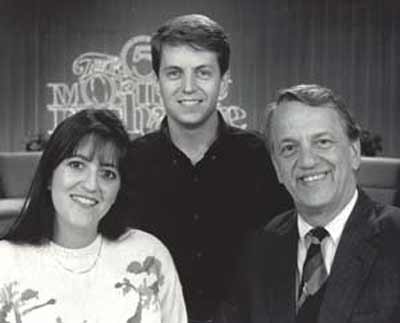
Fred Griffith with daughter Gwen and son Wally on the Morning Exchange set
And the show got political. They brought in people to talk about the issues of the day - the things that people were talking about amongst themselves. Fred himself was approached to run for Mayor of Cleveland many years ago and at the time dismissed the idea. In retrospect he thinks it may have been a good idea, but is not considering anything like that now. "There is nothing wrong with being in public office - those people are important."
Most people don't know Fred's political views. "I think people sometimes think I have no thoughts on the topics of my interviews. I have a lot of personal, economic, political and social views. I am very tolerant of anyone's point of view. If you don't hear me proclaiming it does not mean I don't have a point of view. My tolerance is not a lack of passion." Fred goes on to explain that he does not see his role as one of confrontation, but rather as one giving the opportunity to hear all sides of an issue so that people can make informed decisions. He believes that if you know where the interviewer stands on a subject, he or she is not doing their job. His job, he says, is to be a facilitator rather than to give his own opinions. 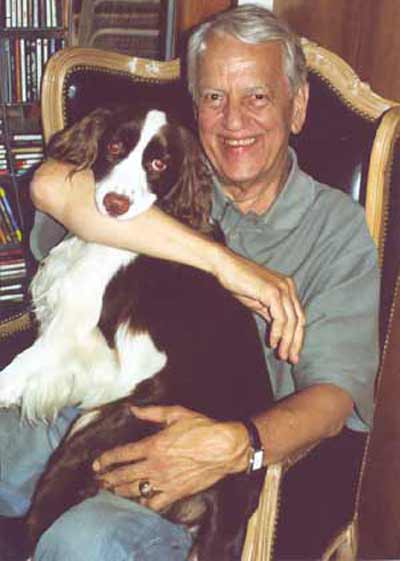
Fred Griffith with dog Zin
In the late 1990's, cable was making major in-roads into the television market. Instead of just competing among themselves, local stations 3, 5, 8, 25 and 43 were now competing with 100 or so cable channels. A new General Manager took over Channel 5 and saw the need to cut costs. "The cost of the show was the same in 1999 as it was in 1992, but now the people asked to pay for those costs with ads were being split between local and cable stations." There were a number of unsuccessful attempts at changing format and time periods but in the end they just didn't work. Toward the middle of 1999 Morning Exchange went off the air and Fred was out of a job. The market may have been changing but it still knew talent and Fred quickly received a call from Terry Moir, who was now with Channel 3 after having been eased out of producing and directing at Channel 5. She offered Fred a show, "15 minutes with Fred," and in 2000 that showed went on the air. 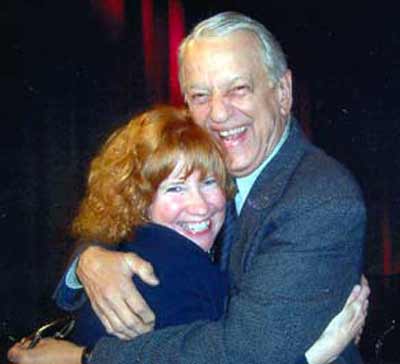
Fred Griffith with longtime producer and now program director at Channel 3, Terry Moir
By 2004 the show became a half hour and he was joined by Hollie Strano in Studio 3. September 2005 brought about another change and an hour long show, "Good Company". His co-hosts include Andrea Vecchio, Eileen McShea and Michael Cardamone. 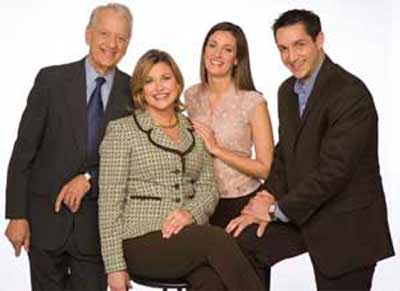
In Good Company with Fred Griffith,
Eileen McShea, Andrea Vecchio
and Michael Cardamone
"I really enjoy the people I work with. There is good chemistry there. Everyday I go to work I just enjoy the hell out of it. It's just fun!"During all of this time Fred was also busy with other things. One major event occurred in May, 1981 when he married Linda Myers and happily acquired two stepsons, Rob and Andrew. Together Fred and Linda now have five children and ten grandchildren. (Plus 3 cats and 2 dogs). Linda had worked in the non-profit area raising funds for medical research. By 1984 Fred was established and doing well at Channel 5. They decided it was time for her to try something else, something they could do together. They new they wanted to do something in the food world. In 1979 Cleveland Magazine had listed Linda as one of the ten best cooks in Cleveland. 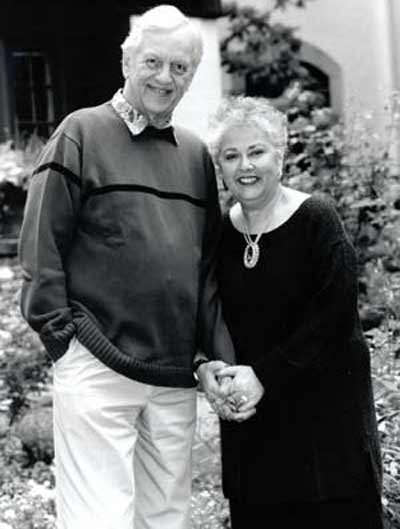
Fred and Linda Griffith in 2002 posing for
the Cleveland Couples book
(photo by Caroline Heller)
So Linda quit the fund-raising business and they thought of different ways of getting into the food business. They thought about opening a specialty food market, to make it a destination store for unique cooking items. They went to food shows all over the country, but decided they didn't know enough about the business end of it. But they did know food. 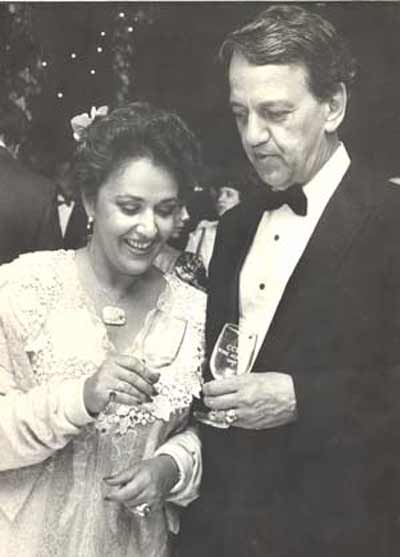
Fred and Linda Griffith celebrating
So they went to Viking Press and got a contract to write about it. The first book was about restaurants in the Midwest ("The Best of the Midwest: Recipes from 32 of America's Finest Restaurants"). It was published in August 1990 and is the book Fred is most proud of. Then came "The New American Farmbook" in 1993. "The best chefs always said there success was due to them starting with good, fresh foods." That was Fred and Linda's inspiration for this book. "Now everyone is talking about fresh, healthy ingredients." 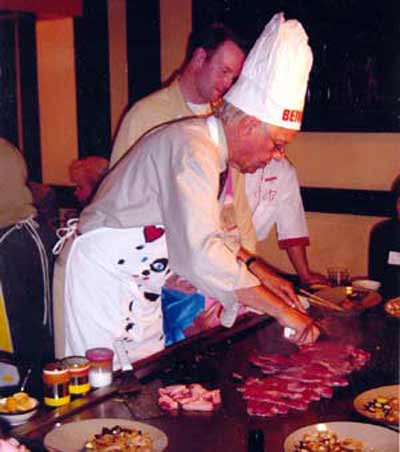
Fred Griffith cooking at a Benihana
for a charity event
Fred and Linda then got a new agent and by 1994 had a new book "Onions, Onions, Onions" which won the much coveted James Beard award. This book was even sold on television's QVC channel. Next in line was a favorite topic of Linda's - one pot cooking. The book was "Cooking Under Cover" followed by "Garlic, Garlic, Garlic". Fred then teamed up with photographer Barney Taxel to create "Cleveland, Continuing the Renaissance" a beautiful and insightful collection of photos (Taxel) and essays (Griffith) on life in Cleveland. 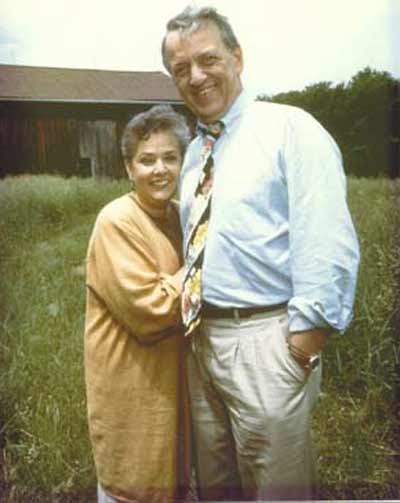
Fred and Linda Griffith in 1990 posing
for the cover of their 2nd book
Fred and Linda switched agents again ("That happens a lot in this industry") and in 2003 "Nuts, Nuts, Nuts" was published and nominated for the Associated of Culinary Professionals Award. "With the thousands of books published to be one of the 34 to be nominated was very special." Fred and Linda also love to travel together. Although he had traveled some before Linda, traveling with her "just makes it that much more enjoyable and exciting." He is one of only a handful of people who have stood on the exact North and South poles. 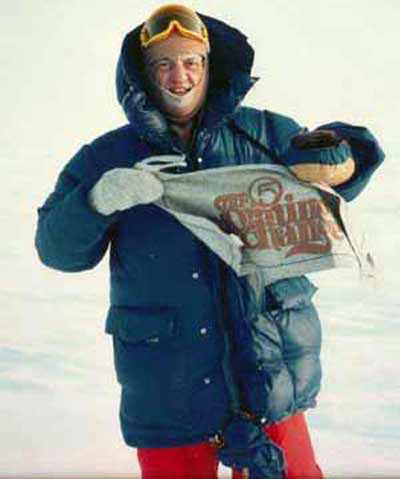
Fred Griffith with a Morning Exchange banner on the North Pole in 1983
He was interested in seeing the Geodesic Dome that was being built at the South Pole. In 1974 was able to become part of the team and secured an invitation to its opening. He produced a piece for ABC on the subject. Then an opportunity arose to go to the North Pole. There was a company that was taking people there via an "airplane with skis". He persuaded the people at Channel 5 to let him go and as such "became bipolar". 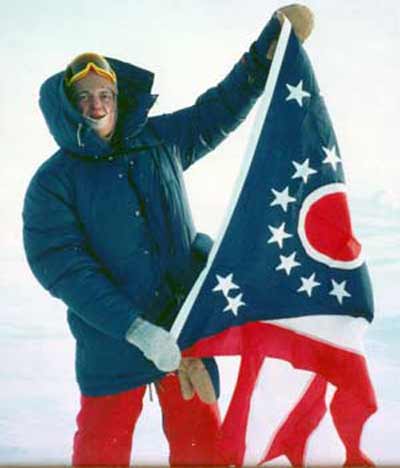
Fred Griffith at the North Pole
Fred and Linda often traveled with a camera crew. Together they traveled across the Gobi Dessert and went on safari in East Africa. They have been to Papua New Guinea, The Galapagos Islands and northwest China - just to name a few of the spots they have visited. They were often accompanied by the late Dick Yurchiak an "absolutely terrific photographer from Indiana." 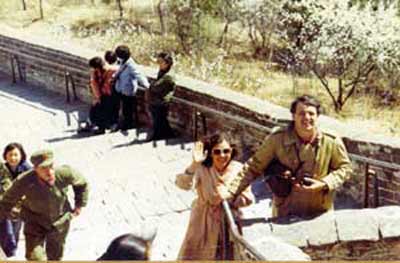
Fred and Linda Griffith
on the Great Wall of China in 1981
In addition, their involvement in the food world takes Linda to France and other European destinations twice a year and Fred once a year. They go "wherever great food is."Fred is happy with his home in Cleveland. "When I wrote the essays for the Cleveland Renaissance book I thought it would all be happening faster than it is. But there are a lot of very positive things about this city. There are a lot of old closed up factories that need to be cleared out and rejuvenated." Fred had a recent discussion with Lev Gonik, Vice President of Technology at Case Western Reserve University "And we talked about whether or not tech people feel welcome here. They should. We should make sure they do." 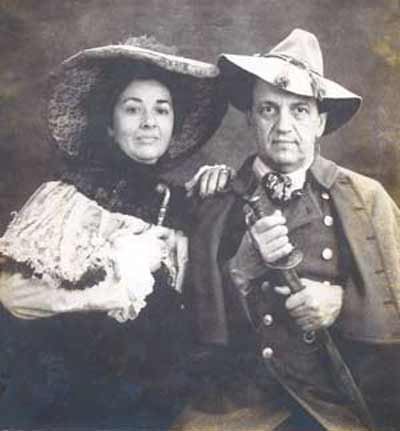
Fred and Linda Griffith in costume
Fred has had the opportunity to work with some of Cleveland's finest and most well known television personalities. He speaks highly of people like Don Webster, who he says is similar in many ways to himself. "He did his job everyday and was not demanding. He was very comfortable to be around." He remembers Dorothy Fuldheim as someone who didn't realize "what an input she has on the media. She was proof that you could challenge the viewer's intelligence and be rewarded for it." In addition to that he adds, "We were really good friends and we liked each other a lot." He thinks Lee Jordan is one of the "brightest folks to come along. She has a keen mind and grasps issues intuitively. We sat together for six years and then and now she really understands things." He calls Ted Henry "a survivor" and is impressed with his knowledge and understanding of the region and the needs of the locality. 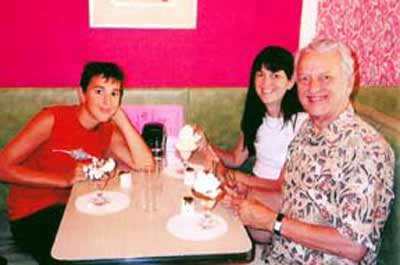
Fred Griffith with daughter Gwen and grandson Forrest on the last day of Draeger's before the Shaker Heights
ice cream store closed
It is said that Fred has more hours live in front of the TV camera than anyone else in history but he has no plans to retire or leave television. He is always working on the next phase and challenges himself to keep up with the times and be part of the future. He keeps himself in mental and physical shape. For twenty years he was a long distance runner and an avid climber. He continues his exercise with daily walks now. He is re-starting his regiment of pumping iron and has never been overweight. "And there is always loads of yard work and house work to be done." What draws people to one person not unlike a magnetic force? Fred Griffith is just such a magnet. People like him and seek him out. Most importantly, in a world filled with cynicism and non-believers, they trust him. During the course of this interview a good number of people stopped to say "Hello" or "I know you". Fred was genuinely nice to each of these people; you could tell he was happy to see them. Not "I'm-a-star" happy but "good-to-see-an-old friend" happy, even though the people were all strangers to him. Fred is a wonderful example of what people can do when they are excited about life and eager to take in all it has to offer. He is a sincerely nice man with a history full of experiences most of us don't even bother to dream about. He is in the Press Club Hall of Fame, the recipient of the Society of Professional Journalists Distinguished Service Award; he is in the Broadcasters Hall of Fame; has won Emmy's and is party of the television academy's Silver Circle. He is extremely active in the community and charitable works and is now the spokesman for University Hospitals. 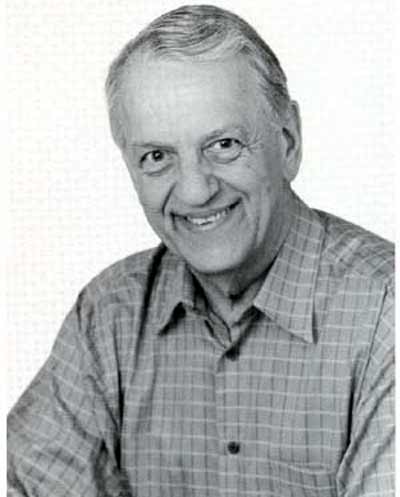
Fred sees the big picture. He knows what is out there and knows he wants to be part of it. And he is. He makes things happen partially because he can convince people to go on the journey with him and partially because he is willing to go alone if that's what it takes. They like him. They trust him. They want to be with him. And they are right in their assessment of Fred Griffith. He pioneered television, made his mark on the cooking world, traveled to tremendous places and continues to do all of this and more. As long as there is something new to learn or experience Fred will be there. And lucky for us, he will tell us all about it.
Profiled by Debbie Hanson
Update: Fred Griffith's last TV Show on WKYC's Good Company Today took place on February 22, 2012. The show featured some of Fred's friends, co-workers and family members. See photos and video from the special day. We wish Fred all the best in his future projects.
Learn more about Fred and Linda's books:
Garlic, Garlic, Garlic : More than 200 Exceptional Recipes for the World's Most Indispensable Ingredient
Onions, Onions, Onions: Delicious Recipes for the World's Favorite Secret Ingredient
The Best of the Midwest : Recipes from 32 of America's Finest Restaurants
Cooking Under Cover : One Pot Wonders -- A Treasury of Soups, Stews, Braises, and Casseroles
The New American Farm Cookbook
Nuts: Recipes from Around the World That Feature Nature's Perfect Ingredient
Cleveland: Continuing the Renaissance (Urban Tapestry Series)
Top of Page
Back to Cleveland Senior Profiles
| 



